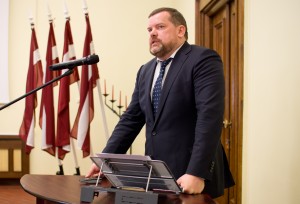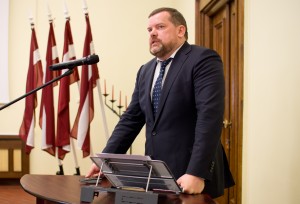
Victory in the World War II can exonerate no one who has perpetrated war crimes or crimes against humanity. Any totalitarian regime is condemnable, and the status of victor in the war cannot protect from responsibility for the committed crimes. They have no prescription. Besides, the launched by Russia war propaganda causes split in Latvia’s society, as it was stressed by the participants of the today’s discussion of experts “May 9 – History, Politics, Propaganda? Why Is History Also the Present Time?” held in Latvian War Museum.
According to Uldis Neiburgs, researcher at the Museum of the Occupation of Latvia, contribution to the victory over the Nazi by no means make the Stalinist crimes as not happened or less terrifying. The inherited from the USSR period, modern Russia-cultivated “Victors’ Myth”, which is popular also among a part of Latvia’s society, unfortunately does not show that there exists understanding of the fate of our country in the World War II. The existence of the “Victors’ Myth” probably strengthens the identity of Russians in Latvia, but it surely does not promote their mutual agreement with Latvians and their sense of belonging to the state of Latvia. The historian stressed that the key for the society consolidation, at least regarding its past which often determines also today’s agenda, is to be looked for not in division of Latvia’s society in “victors” and “losers”, or in “liberators” and “fascists”, but it should be searched in a true wish to comprehend the fate of one’s own country in the World War II and communicate that correctly to those who so far has lacked such understanding.
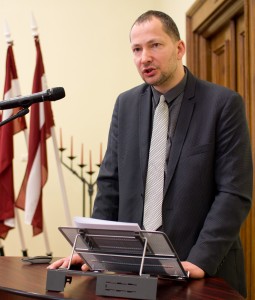
The experts mentioned that Russia would have to be the co-partner in investigation of war crimes and crimes against humanity by allowing access to its state archives. It was also stressed that Russian government would rather have to evaluate adequately the Stalin regime’s crimes, not praise its successes. While investigating the Stalin regime’s crimes, Russian officials would possibly start to comprehend Latvia’s attitude towards the World War II and its consequences. The crimes against humanity, perpetrated by the leaders and military commanders of Nazi Germany, have been tried at Nuremberg International Military Tribunal in 1945 – 1946, and they have been deservedly punished. According to the experts’ discussion participants, historical truth demands also investigation of crimes against civil persons, committed by the Red Army.
 The experts indicated that the lack of proper assessment of the Communist regime’s crimes, including those perpetrated by the Red Army against civil persons, facilitates revival of Stalin cult and glorifying in Russia, biased interpretation of historical events and their significance and its use in politics, as well as forcing of the partial view of history on the countries condemning similarly both the Nazi and Communist regimes. Thereby, reconciliation between military persons and improvement of international relations with Russia are hampered.
The experts indicated that the lack of proper assessment of the Communist regime’s crimes, including those perpetrated by the Red Army against civil persons, facilitates revival of Stalin cult and glorifying in Russia, biased interpretation of historical events and their significance and its use in politics, as well as forcing of the partial view of history on the countries condemning similarly both the Nazi and Communist regimes. Thereby, reconciliation between military persons and improvement of international relations with Russia are hampered.
Ineta Ziemele, professor at Riga Graduate School of Law, stressed that historical truth would have to be clarified, and legal processes are necessary to hold the guilty persons liable and express apologies to the victims.
Russia tends to use a selection of particular historical facts and myths for explaining its domestic and foreign policy actions. Māris Cepurītis, researcher at the Centre for East European Policy Studies, stressed that, disregarding the calls to leave history to historians, over the last years, Russia has been intensively politicizing history, and the attention paid to history has not resulted in support for history as the science, but in dogmatization of a single true history and imposing of this conception on neighbour countries, including the Baltic states. He also mentioned that the connecting of historical issues with politics is especially obvious in Russian policy planning documents where history is presented as a foreign policy or even security issue.
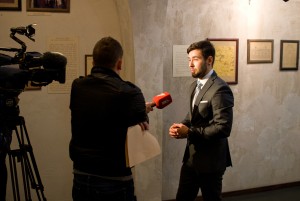
Also according to Andis Kudors, Executive Director of the Centre for East European Policy Studies, the historical events regarding May 9 and related to it should not be considered separately from Russian foreign policy where dissemination of the specific biased interpretation of the World War II events is one of the elements of Russian public diplomacy. The activating of the theme of the World War II in Russia is tied to the process of constructing the national identity, unfortunately, the process goes beyond the borders, and it conflicts with the identity creation processes in the neighbouring countries. The political scientist explained that the spreading through the media and compatriots policy of historical interpretation under control on the part of Russian authorities causes split in Latvia’s society and hampers its consolidation process.
Ainārs Lerhis, Chairman of the Board of the Centre for East European Policy Studies, senior researcher at the Institute of Latvian History at the University of Latvia, indicated that the tying of the historical context of May 9 to Russia’s imperial ambitions is an especially dangerous tendency. Using fight against “fascism and Nazi” as a pretext, Russia perpetrated cyber attacks on Estonia, invaded Georgia and Ukraine. History has become the real part of hybrid war.
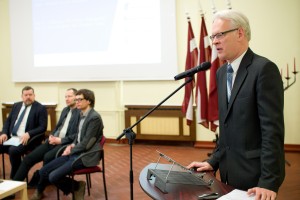
Lerhis stressed that the commemoration of the war victims on May 8 has been the long-time European tradition since ever the end of the World War II. It is a silent day of smarting pain and memories about those who died during the World War II, but not the loud celebration. He also reminded that the victory over Nazi Germany did not bring freedom and state independence for Latvia, but it was the repeated occupation brought by the USSR. As the result of the war, one of the totalitarian regimes was defeated, but the other totalitarian regime continued its existence and regained its control of Latvia. That repeated occupation by the USSR had its high price for Latvia – many tens of thousands of Latvian citizens became refugees, the The historian indicated that the Soviet regime renewed its repression against population, it carried out militarization, politically motivated increased industrialization, destruction of the previous agricultural system, there was an influx of labour power from the other USSR Republics (colonization – change of membership of Latvian population), Russification, ideologization and subordination to the single party’s dictatorship.
The discussion of experts “May 9 – History, Politics, Propaganda? Why Is History Also the Present Time?” was organized by Latvian War Museum, the Museum of the Occupation of Latvia, the Centre for East European Policy Studies, the Institute of Philosophy and Sociology at the University of Latvia and the Institute of Latvian History at the University of Latvia.
